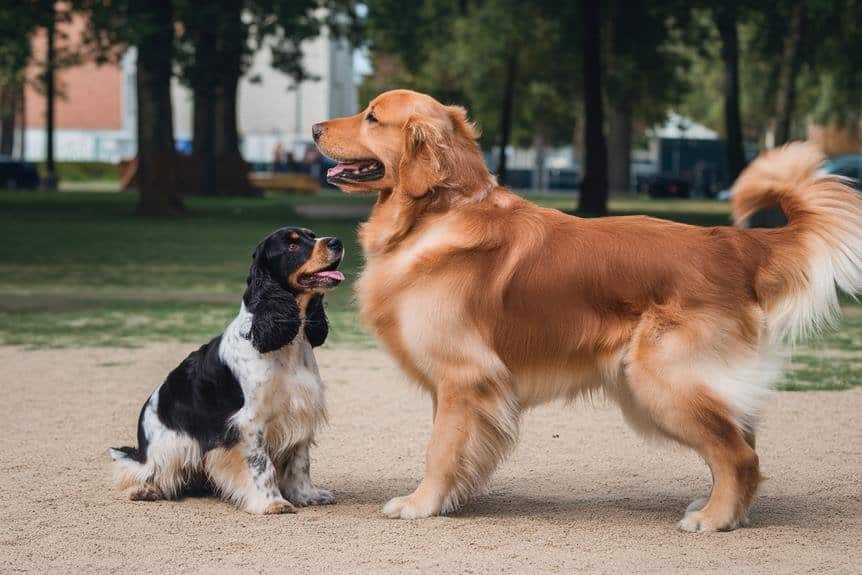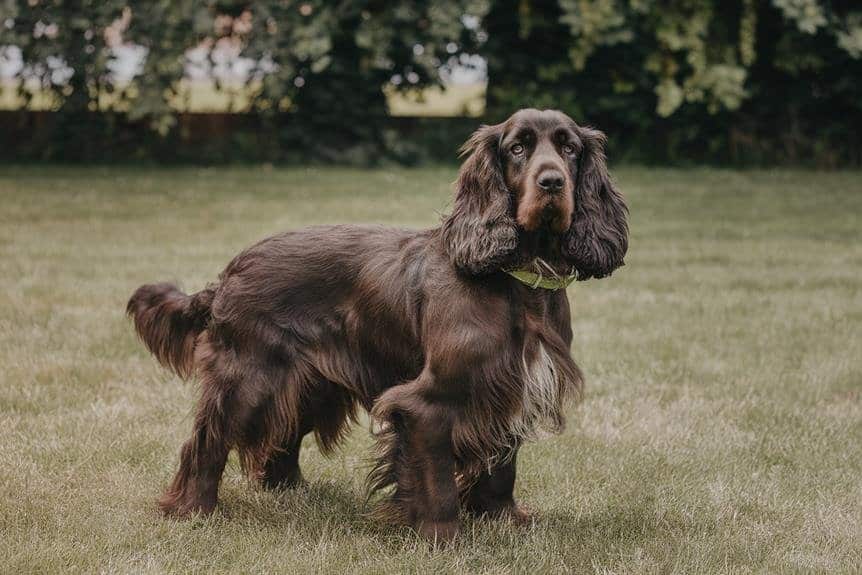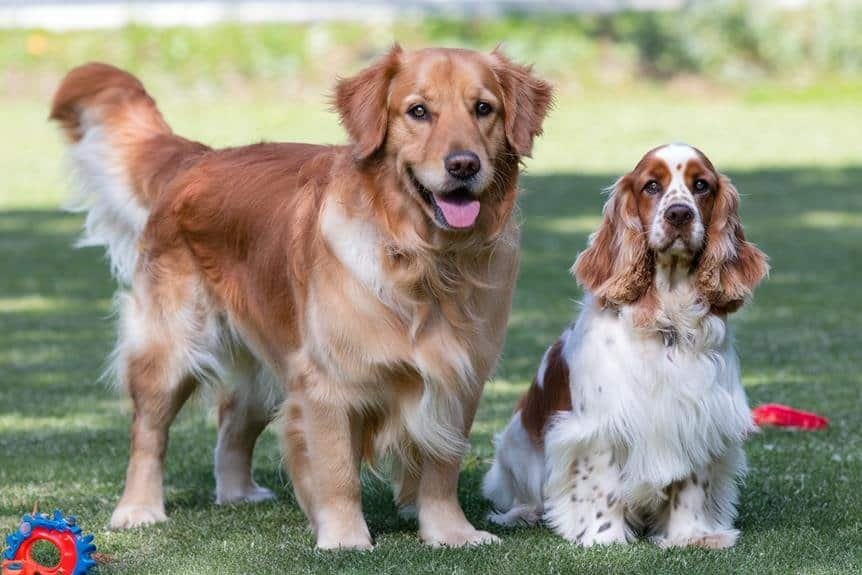You’re thinking about adding a furry friend to your family, and you’ve narrowed it down to two popular breeds: the Golden Retriever and the Cocker Spaniel.
Both are beloved companions, but they come with distinct characteristics that could make one a better fit for your lifestyle. Whether you’re looking for an energetic outdoor partner or a cuddly lap dog, understanding the differences between these two breeds is essential.
Let’s explore what sets these lovable canines apart and help you determine which one might be your perfect match.
Visual Differences of Golden Retriever & Cocker Spaniel

How can you tell a Golden Retriever from a Cocker Spaniel at first glance? The size difference is striking.
Golden Retrievers are much larger, with males standing up to 24 inches tall and weighing up to 75 lbs. Cocker Spaniels, on the other hand, are compact, reaching only 15.5 inches at most and weighing no more than 30 lbs.
Their coats also set them apart. Golden Retrievers sport long, thick feathered coats in shades of gold or cream.
Cocker Spaniels have silky, wavy double coats that come in various colors and patterns.
You’ll notice Golden Retrievers have a broader head with a friendly expression, while Cocker Spaniels boast a rounded head with expressive eyes.
These distinct features make it easy to spot the difference between these two lovable breeds.
A Quick Overview – Golden Retriever & Cocker Spaniel
| Feature | Golden Retriever | Cocker Spaniel |
|---|---|---|
| Average height (adult) | 21-24 inches | 14-15 inches |
| Average weight (adult) | 55-75 lbs | 20-30 lbs |
| Lifespan | 10-12 years | 12-14 years |
| Maintenance Level | Medium. Requires regular exercise and vet check-ups. | Medium. Needs extra grooming attention. |
| Temperament | Friendly, adaptable | Affectionate, sensitive, stubborn |
| Exercise | High. Requires significant physical activity. | Moderate to high. Energy levels vary based on type. |
| Trainability | High. Eager to please and responds well to training. | Moderate. Can be stubborn but affectionate. |
| Family-friendly | Yes. Excellent family pets. | Yes. Great with families but may need monitoring due to sensitivity. |
Which Breed Is Right for You?

Choosing between a Golden Retriever and a Cocker Spaniel depends on your lifestyle, living situation, and personal preferences.
If you have a spacious home and an active family, a Golden might be your ideal companion. They’re great with kids and other pets, and their adaptable nature makes them easy to train. However, be prepared for regular brushing to manage shedding.
On the other hand, if you live in a smaller space but still want a loving family dog, a Cocker might be the better choice. They’re more compact and can adapt to apartment living, though they still need daily exercise.
Keep in mind that Cockers require more grooming attention and may need extra patience during training.
Whichever breed you choose, remember to take into account their specific health concerns and plan for regular vet check-ups.
Golden Retriever & Cocker Spaniel Puppy Price

When it comes to bringing home a new furry friend, the price tag can be a significant factor. Golden Retriever puppies typically cost more than Cocker Spaniels, with prices ranging from $1,000 to $4,000 compared to $1,000 to $2,000 for Cockers. Good breeders often charge higher prices due to their reputation and careful breeding practices.
Remember, the puppy price isn’t the only expense you’ll face. Both breeds require vaccinations, health checks, and initial supplies, which can add up quickly.
Keep in mind that prices may fluctuate based on demand and location. Golden Retrievers, being one of America’s favorite breeds, can command higher prices. Don’t be surprised if you encounter waiting lists for both breeds, especially from reputable breeders.
While the initial cost might seem steep, investing in a well-bred puppy can save you money on potential health issues down the road.
Golden Retriever & Cocker Spaniel History

The rich tapestry of canine history unfolds with the Golden Retriever and Cocker Spaniel, two breeds that have left indelible paw prints on our hearts.
Both have fascinating origins rooted in hunting. Golden Retrievers were developed in Scotland during the late 19th century, specifically for retrieving game. Their adaptability and excellent retrieving skills quickly made them popular.
Cocker Spaniels, on the other hand, have a longer history dating back to 14th century Britain. They were bred to flush and retrieve birds from thick underbrush.
In the 20th century, the breed split into American and English varieties. American Cockers focused on looks, while English Cockers maintained their hunting prowess.
You’ll find that both breeds gained popularity in the U.S. during the 20th century. Golden Retrievers charmed people with their friendly nature, while Cocker Spaniels once reigned as America’s favorite breed in the 1930s.
Golden Retriever Overview

If you’re considering a Golden Retriever, you’ll want to know about their friendly personality, training needs, and health considerations.
These lovable dogs require regular exercise and mental stimulation to stay happy and healthy.
Golden Retrievers are great family pets, but they need proper care and attention to thrive.
Golden Retriever Personality & Temperament
Known for their amiable nature, Golden Retrievers embody the quintessential family dog. These friendly pups have a good temperament that makes them perfect companions for households with children.
You’ll find that Goldens are calm, enthusiastic to please, and highly trainable, responding well to positive reinforcement.
Your Golden Retriever will thrive on social interaction and needs regular exercise to stay happy and healthy. They’re playful “goofballs” that adapt well to various lifestyles, but they do require ample space due to their medium to large size.
Weighing between 55-75 lbs, these dogs need room to move and play.
If you’re looking for a sociable, fun-loving companion that’s great with families, a Golden Retriever might be the perfect match. Their friendly demeanor and trainability make them excellent dogs for first-time owners or experienced pet parents alike.
Golden Retriever Training
Training your Golden Retriever is a rewarding experience, thanks to their intelligence and enthusiasm to please. You’ll find these dogs are easy to train, responding well to positive reinforcement techniques like treats, praise, and playtime.
Regular training sessions are essential for keeping your Golden mentally stimulated and preventing behavioral issues.
Start early with socialization to guarantee your pup grows into a well-adjusted adult. Expose them to various environments and situations to build confidence.
Golden Retrievers excel in obedience and agility training, so consider incorporating these activities into your routine.
Golden Retriever Health & Care
A healthy Golden Retriever is a happy companion. To keep your furry friend in top shape, regular vet check-ups are essential.
These lovable dogs typically live 10-12 years but can face health issues like hip dysplasia and certain cancers. That’s why health testing is so important.
When choosing a Golden, look for reputable breeders who screen for hereditary conditions. They’ll test hips, elbows, and eyes for PRA. This helps guarantee you’re getting a pup with fewer genetic health problems.
Your Golden will need daily exercise to stay fit and content. A good romp or game of fetch does wonders!
Don’t forget about grooming, either. Their beautiful coats require regular brushing to prevent matting and keep shedding under control.
With proper care, your Golden Retriever will be a loyal, healthy companion for years to come.
Golden Retriever Exercise
Golden Retrievers thrive on exercise, making them perfect companions for active individuals. These energetic dogs need about 1 to 2 hours of daily physical activity to stay healthy and happy.
You’ll find that Golden Retrievers excel in various activities, from agility training to obedience exercises.
To keep your furry friend in top shape, mix up their routine with walks, runs, and fetch games.
Don’t forget mental stimulation, too! Puzzle toys can help keep their minds sharp.
Regular exercise isn’t just fun for your Golden Retriever; it’s essential for preventing obesity and behavioral issues.
Golden Retriever Suitable For:
While exercise is essential for Golden Retrievers, it’s just one aspect of their suitability as pets. These friendly dogs are well-suited for various households, especially families with small children. Their gentle nature and patience make them excellent companions for kids.
Golden Retrievers thrive in homes that can provide:
- Daily exercise and mental stimulation
- Regular grooming to maintain their coat
- Consistent training and socialization
- Routine vet check-ups for good health
You’ll find Golden Retrievers adaptable to different living situations, from busy family homes to quieter settings. Their intelligence and willingness to please make them highly trainable, perfect for first-time dog owners or experienced pet parents alike.
Keep in mind that they’re prone to certain health issues, so maintaining their good health through proper care and regular vet visits is vital. With the right attention, your Golden Retriever will be a loving, loyal companion for years to come.
Cocker Spaniel Overview

You’ll find Cocker Spaniels to be affectionate and loyal companions, but they do require significant care and attention.
These medium-sized dogs need consistent training, socialization, and daily grooming to maintain their silky coats and prevent behavioral issues.
While they’re great family pets, you’ll want to supervise interactions with young children and be prepared for their exercise needs and potential health concerns.
Cocker Spaniel Personality & Temperament
Cocker Spaniels are beloved for their affectionate and loyal nature, making them excellent companions for families and individuals. Their temperament can vary, but they’re generally playful and energetic dogs that thrive on human interaction.
You’ll find these pups to be sensitive souls, sometimes prone to neurotic behaviors if not properly trained and socialized.
While Cocker Spaniels can be great with kids, they may not always tolerate rough play. It’s important to supervise them around small children to prevent any defensive reactions.
These dogs need regular exercise to stay happy and healthy, which helps prevent behavioral issues.
Keep in mind that working line Cockers tend to be more energetic than their show line counterparts. They’ll require extra mental stimulation to keep their active minds engaged.
With patience and consistency, you’ll find Cocker Spaniels to be devoted and loving family members.
Cocker Spaniel Training
Training a Cocker Spaniel requires patience and consistency due to their intelligent yet sometimes stubborn nature.
You’ll need to use positive reinforcement techniques, as these sensitive dogs respond best to encouragement rather than harsh corrections. Early socialization is essential to prevent possessive behaviors and anxiety, especially around strangers and children.
To keep your Cocker Spaniel mentally stimulated and prevent destructive behaviors, combine regular training sessions with puzzle toys.
These smart pups thrive on attention and interaction, so make sure to spend quality time with them to avoid separation anxiety.
Cocker Spaniel Health & Care
Despite their charming personalities, Cocker Spaniels come with a set of health and care requirements that potential owners should consider.
These pups typically live 12-15 years but can face health issues like ear infections and eye problems. Regular vet check-ups are a must to catch these early.
When it comes to grooming, be prepared for daily brushing sessions! Their silky double coats need constant attention to prevent matting.
You’ll also want to schedule professional grooming appointments to keep your Cocker looking sharp.
Exercise is essential for these energetic dogs. Daily walks and playtime will help maintain a healthy weight and prevent behavioral issues.
Remember, a tired Cocker is a happy Cocker!
Lastly, don’t forget about training and socialization. These smart pups can develop separation anxiety, so consistent training will help guarantee a well-adjusted furry friend.
Cocker Spaniel Exercise
Keeping your Cocker Spaniel fit and happy isn’t just about grooming and vet visits. These high-energy dogs need plenty of exercise to stay healthy and well-behaved.
You’ll want to set aside 30 to 60 minutes daily for activities like walks, playtime, or dog sports. This helps burn off their energy and prevents boredom-related issues.
Working Cocker Spaniels, in particular, require more exercise than show lines. They’re bred for performance and thrive on mental stimulation.
Regular exercise isn’t just about physical health; it’s essential for their mental well-being too. It’s a great way to socialize your pup, letting them interact with other dogs and people.
Cocker Spaniel Suitable For:
With their affectionate nature and adaptable size, Cocker Spaniels are suitable for a wide range of households. These lovable dogs can fit into various living situations, from apartments to larger homes, as long as they receive enough exercise and mental stimulation.
Cocker Spaniels are particularly well-suited for:
- Active families who enjoy outdoor activities
- Singles or couples looking for a devoted companion
- Seniors seeking a manageable, affectionate pet
- Those with patience for regular grooming needs
While Cocker Spaniels are great with families, they may need supervision around small children due to their sensitivity.
Their friendly disposition makes them excellent therapy dogs, too. If you’re looking for a loyal, adaptable, and affectionate medium-sized breed that’s happy to cuddle or play, a Cocker Spaniel might be your perfect match.
Just be prepared for daily brushing sessions!
Frequently Asked Questions
What Is Better, a Cocker Spaniel or a Golden Retriever?
You’ll find both breeds have their merits. Golden Retrievers are more adaptable and easier to train, while Cocker Spaniels live longer. Consider your lifestyle, space, and grooming preferences to determine which breed suits you best.
What Is the Temperament of a Golden Retriever Cocker Spaniel?
You’ll find a Golden Retriever-Cocker Spaniel mix has a friendly, energetic temperament. They’re typically affectionate and enthusiastic to please, but may inherit sensitivity from the Cocker side. They’re usually good with kids and respond well to positive training.
Is a Golden Retriever the Best Dog for Me?
A Golden Retriever could be perfect for you if you’re active, have time for daily exercise, and want a friendly, intelligent companion. They’re great family dogs but need lots of attention. Consider your lifestyle and living space carefully.
What Are the Pro and Cons of Cocker Spaniels?
You’ll love a Cocker Spaniel’s affectionate nature and long lifespan. They’re great with kids but need regular grooming. Be prepared for potential health issues and anxiety. Their loyalty is a plus, but they can be territorial.
Conclusion
You’ve now got a good overview of Golden Retrievers and Cocker Spaniels. Remember, there’s no “better” breed – it’s all about finding the right fit for your lifestyle. Consider your living space, activity level, and grooming commitment. Goldens need more exercise and space, while Cockers are adaptable to smaller homes but require regular grooming. Both make loving companions. Take your time, do your research, and choose the breed that’ll be your perfect furry friend for years to come.

